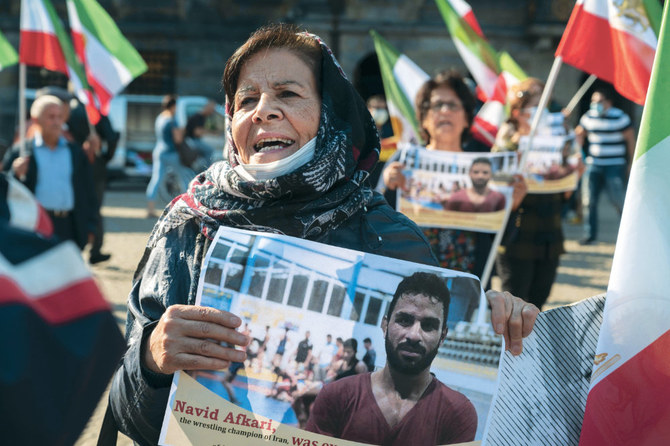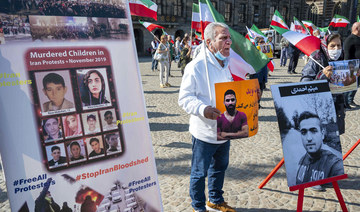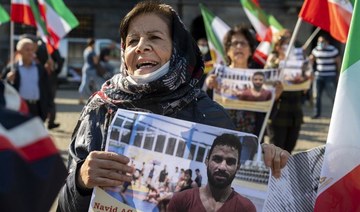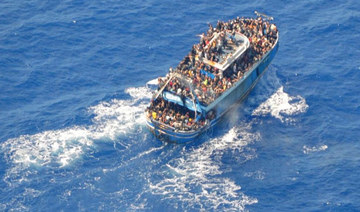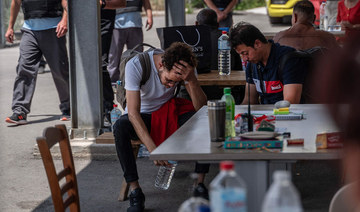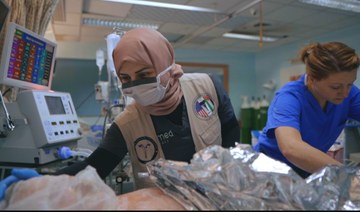PARIS: Iran has signalled it intends to ignore a growing outcry over its use of the death penalty against people arrested during anti-government protests by executing with unusual swiftness a wrestler whose case had won international attention, activists say.
Navid Afkari, 27, a wrestler who had won national competitions, was hanged on Saturday at Adelabad Prison in the southern city of Shiraz after being convicted of committing a murder during protests that rocked the city two years ago.
US President Donald Trump had urged Iran to spare the life of Afkari while international rights organizations had insisted allegations, he had been tortured into confessing needed to be investigated and that there was no firm evidence of his guilt.
Using a technique that has been repeatedly denounced abroad, Iranian state broadcaster IRIB on Aug. 5 broadcast a purported confession by Afkari, in which he was shown reenacting the alleged crime scene.
But activists are incensed that the Iranian judiciary took no account of claims — made by Afkari himself in a complaint — that he had been tortured into confessing with methods that included beating and having alcohol squeezed up his nose.
SPEEDREAD
- US President Donald Trump had urged Iran to spare the life of Afkari while international rights organizations had insisted allegations, he had been tortured into confessing needed to be investigated and that there was no firm evidence of his guilt.
His execution came as the use of capital punishment in Iran — which sends more people to death every year than any country other than China — is coming under increasing scrutiny after the government was rocked by protests prompted by increasing economic hardship.
“It is deeply disturbing that the authorities appear to have used the death penalty against an athlete as a warning to its population in a climate of increasing social unrest,” five UN rights experts said in a statement Monday.
Tara Sepehri Far, Iran researcher at Human Rights Watch, described as “unusual” the speed with which Afkari’s death sentence was implemented.
He had been sentenced to death in October 2019 and the verdict was upheld by an appeals court in April.
“At least part of the system ... feel that responding to international outcry is backing down and could make them more vulnerable,” she told AFP.
“There has also been a growing anti-death penalty movement inside the country against the sentences issued in connection to the protests. I think they might fear that if they don’t show force they appear weak.”
The judiciary had in July halted the executions of three young men who took part in November 2019 anti-government protests, in the face of a furious social media campaign both inside and outside Iran under the hashtag #Don’t_Execute (#Edam_Nakon in Persian).
But Iran in August went ahead with the execution of Mostafa Salehi, convicted of shooting dead a member of the security forces during 2017-18 protests in the Isfahan region.
Mansoureh Mills, researcher on Iran at Amnesty International, argued that the “general mood among Iranians is shifting away from the death penalty” while the world is “looking in horror” at Iran’s increasing use of capital punishment against regime opponents.
“The Iranian authorities are using executions like that of Navid Afkari as a tool of political control and oppression to instil fear among the public.”
Activists say that not only did Iran ignore the claims of torture but it also rushed ahead with the execution without allowing for the chance of reconciliation with the family of the victim.
“The authorities were afraid that waiting one more week would have made the political costs of his execution unaffordable,” said Mahmood Amiry-Moghaddam, founder of the Oslo-based NGO Iran Human Rights (IHR), describing the execution as “hasty.”
He said a “likely explanation” was that Afkari was in such poor condition due to torture that it was decided to hang him to avoid further embarrassment. He was also buried hastily at night, Amiry-Moghaddam noted.
The UN experts said Afkari’s family had been traveling to Shiraz in the hope of reconciliation with the family of the victim, which under Iran’s Sharia law can overturn the death sentence.
These elements “suggest that there was an attempt by the authorities to expedite his execution,” they added.
The judiciary in Shiraz’s Fars province said in a statement quoted by the Mizan news website that all the appropriate legal steps had been observed, denying Afkari had been tortured and slamming “untrue material” published about the case.
Reporting on Afkari’s execution, Iranian state media said the man killed, Hasan Turkeman, was an employee of the municipal water company.
However, activists noted that after his death he was described by Mizan as a member of the security forces, with pictures showing a well-attended funeral.
The purported confession broadcast by IRIB showed Afkari describing the incident and then showing how Turkeman was allegedly stabbed in the back with a knife by a passenger — played by Afkari himself — on a passing motorbike.
According to a document posted by the Human Rights Activists News Agency, Afkari had filed a complaint with the judiciary in Sept. 13, 2019 saying he had been forced to give false confessions under torture.
“I have all kinds of documents to prove my innocence,” said a voice recording attributed to Afkari by supporters that went viral after his execution.
“If I am executed, people should know that in the 21st century, Iran still executes innocent people.”



